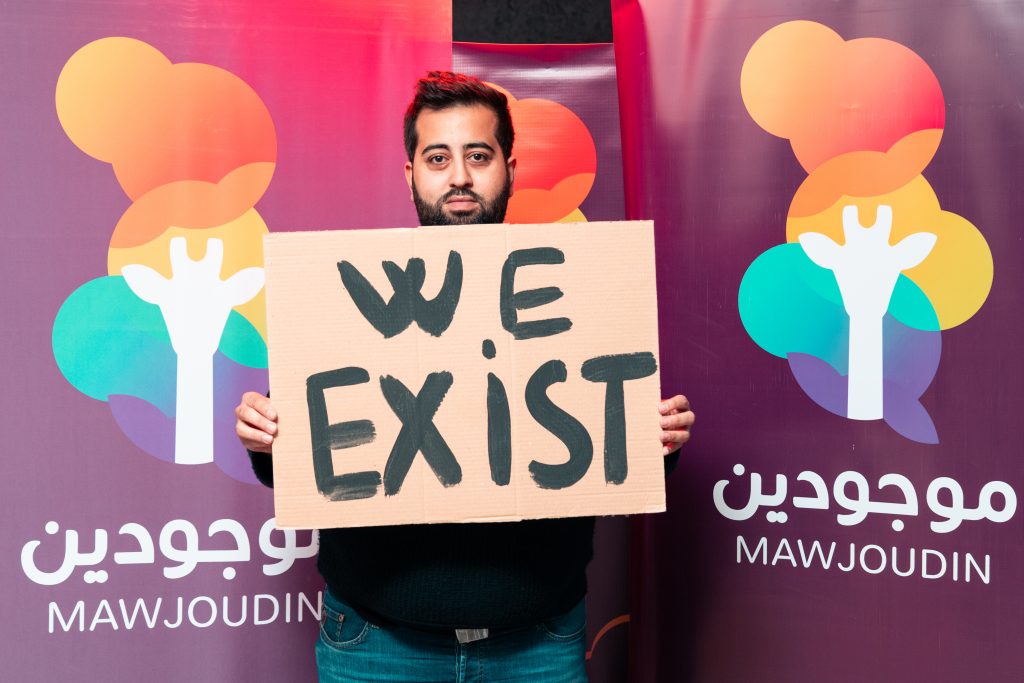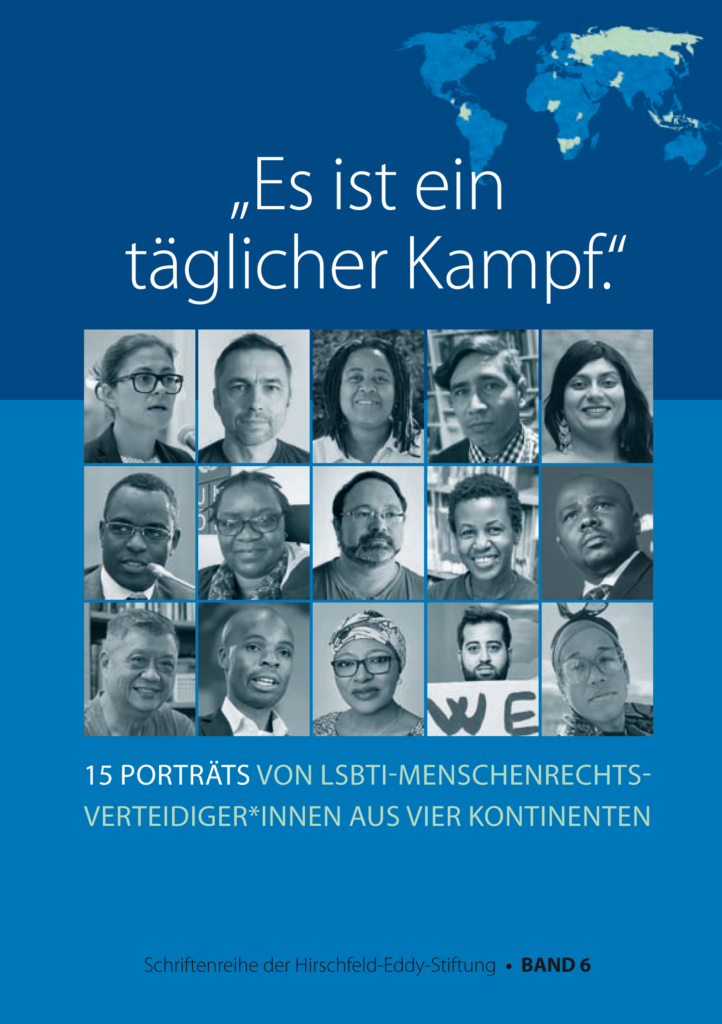Ali Bousselmi (33) is a human rights activist from Tunisia. He is a co-founder and executive director of the Mawjoudin organisation, which promotes equality for LGBTQI+ and other marginalised groups.
Translated from Hirschfeld Eddy Foundation series volume 6 “15 Portraits of LGBTIQ+ human rights defenders” (2021): download or order free of charge (in German) here.
Ali Bousselmi always knew he was somehow different. Yet from a very young age he also knew he would accept it easily in the future. In middle school at age 13, he truly felt different but didn’t do much about it. “It was hard to put a label on who I was because we didn’t have access to information about sexuality and we didn’t talk about it, it was taboo,” he says. He was 19 when he started identifying as a gay man. Yet deep down, he wasn’t too convinced about that label. “After a few years, the word ‘queer’ started spreading around and I knew it was what represents me the most.”
Born in a family of five in the Medina of Tunis in 1988, Bousselmi grew up in a largely homophobic society. The Medina is a working-class district, and not an easy place for a young person who deviates from the norm to defend himself. Bousselmi succeeded in doing so, for which he thanks his family who supported and accepted him. His parents are very open-minded and tolerant, and he could always count on them. Strictly speaking, Bousselmi did not come out to his family. “I never felt the need to,” he says. “Yet I never denied or hid who I was. On the contrary, I wrote it on the rooftops!” He also openly describes himself as an atheist, a courageous act in a country in which most people call themselves Muslims.
Before Bousselmi was able to identify openly as queer, he had to travel a long road of self-discovery. Curiosity was what powered him in his youth: were there others like him, who were they, where could he find them, and what would the first contact be like? Then he began meeting people. Quite naive at the time, he also mentions relationships with older men. But he was fortunate in that there were never any problems and nobody sought to exploit him or his trust. At a time when internet access and skills were very limited in Tunisia, he nevertheless managed to use the web as an important source of orientation and self-knowledge. He forged deep friendships with a gay man and a bisexual woman that lasted for years.
Yet identifying as queer also had negative consequences, both in his neighbourhood and at his university. He lost some friends, although does not miss them. His strong sense of self helped him impose his own views. “Today no one dares to say anything homophobic to me,” he says. “It hasn’t been easy to get here, and it continues to be a daily struggle. But when people see that you accept yourself fully and don’t care about their opinions, then they don’t know what to say anymore and change the subject. I insist on debating it, though. I’ve always told myself I might be able to change things that way.”
Bousselmi’s choice of what to study reflects his wish to effect change. After high school he decided to study law at the University of Tunis. He specialised in public law, laying the foundations for his later work. Like his father, he is passionate about art. His special love is photography, and he has taken courses in the field since his youth.
Path to activism
As a student Bousselmi spent a good part of his free time working with Amnesty International. In the beginning, before the Tunisian Revolution, it was his father who encouraged him to contact Amnesty. In 2005 Bousselmi visited the Tunis office for the first time, and then a second time in 2008. But he didn’t encounter any young people, so couldn’t see himself working there. That changed in the wake of the revolution. Shortly thereafter, in 2011, he visited Amnesty again. This time he met many young people, full of energy, and decided to stay and help. He founded “Group Medina”, and joined the women’s committee, youth committee, children’s committee and film club. He was also responsible for social media communications and event logistics. “Amnesty was a school for me,” he says. “I gained a great deal of experience and knowledge about human rights. But it was the wish to change and stand out that pushed me to become an activist.”
Amnesty International therefore remained an interim station. In 2012 Bousselmi and some friends founded a collective known as Article 13, which promotes freedom of movement and fair development in Tunisia. In 2013 he and his partner Abir Boukomine began to think about creating their own organisation to focus on LGBTQI+ rights, because aside from the Tunisian Association of Democratic Women (ATFD), none of the domestic human rights organisations were working for this cause. Bousselmi and his companions wanted a safe space for members of the LGTBQI+ community in Tunisian civil society – a space that did not yet exist. Bousselmi also took part in the “Mantiqitna Camp” in Turkey at the time, which brought together LGTBQI+ activists from MENA (Middle East and North Africa). It was the first time he could meet with queer people and activists from the entire region and see their work and learn from them. He describes the experience as very encouraging for what he built up later.
In 2014 Bousselmi and Boukomine opened a Facebook account called Mawjoudin (“we exist”) and founded the Mawjoudin Initiative for Equality. Bousselmi looks back at those early days as the most joyful period of his life. “It was just wonderful to feel that my dream was coming true,” he says. Work for the organisation continues to consume much of his time. He loves it, and it fulfils him. In 2018 he joined the executive board. He spends what little time he has left with family and friends.
Mawjoudin is officially registered in Tunisia as a non-profit NGO. It works to achieve equality, human rights, bodily rights, and sexual rights for LGBTQI+ people and other marginalised groups and individuals, through a wide range of activities. Along with creating safe spaces for the community, its members do advocacy, documentation, capacity building and lobbying. They also raise awareness in civil society for topics like sexual diversity and equality.
The Mawjoudin organisation takes a decentralised, inclusive approach, which means it explicitly includes people from different backgrounds, age groups, genders and sexual orientations, and from different cities and remote areas throughout Tunisia. The idea is to build bridges among different LGBTQI+ groups and communities across the country, and join forces to gain and strengthen rights. The organisation has strong and integrated networks not only within the country but also internationally. “Our main aim is to promote diversity and non-discrimination in order to combat oppression,” explains Bousselmi. “We are dedicated to defending the rights of LGBTQI+ individuals so they can live openly in a culture that respects and values their dignity.” The organisation also concentrates on migration and asylum issues. Its efforts to lobby the current parliament to change discriminatory laws against LGBTIQ+ people have thus far not been successful.
Mawjoudin’s work in Tunisia is sorely needed. Homosexuality is subject to prison sentences of up to three years, “Offending public morality” is also an imprisonable offence, and is applied especially to trans people. Anal tests can be conducted in the country in an attempt to determine whether people are gay – a violation of the UN Convention against Torture of which Tunisia is a signatory. “LGBTQI people [in Tunisia] face several forms of violence – psychological, physical etc. – in family settings, schools, hospitals, the public sphere and many private spaces,” reports Bousselmi.
Desires and successes
Bousselmi sees progress in the 2017 decision by Beji Caid Essebsi, Tunisia’s president at the time, to set up a commission for individual liberty and equality (COLIBE – Commission des libertés individuelles et de l’égalité). It produced the COLIBE report, which recommended revoking all laws that criminalise sexual orientations or gender identity. This recommendation, however, has yet to be implemented.
Being an LGBTIQ+ organisation is a challenge in itself in a society as homophobic as that of Tunisia, especially while pursuing such visible activities as the Mawjoudin Queer Film Festival. Yet there have also been successes. The film festival and other actions are helping to weaken the taboos on homosexuality and open the topic for discussion. Mawjoudin is also raising its profile among other groups, institutions and government bodies, and is invited to take part in strategic meetings and projects. Outside the capital city, however, where attitudes are more conservative, LGBTQI+ people still face great difficulties.
Another success lies in promoting and producing queer art, which was not yet known in the MENA region although the artists of course exist. Interested in art himself, Bousselmi sees a special opportunity here. “I call on donors to make more funds available for producing queer art, because it is through art that we show who we are and through art that we also cross borders,” he says. More funding in general is needed for the organisation’s work, for example to provide housing to queer people who were kicked out of their homes because of their identity and find themselves on the street. Regarding funding, Bousselmi also wants to minimise bureaucratic formalities that consume considerable time and resources, and maximise transparency. Mawjoudin already declines to work with problematic and opaque donors. Its first supporters, which continue to work with the organisation to this day, include LGBT Denmark, the Lesbian and Gay Federation in Germany (LSVD), the Sigrid Rausing Trust (London), Access Now, Hivos, NDI (National Democratic Institute, USA), IWPR (Institute for War and Peace Reporting) and OXFAM. They respect Mawjoudin’s request to not intervene in the content of the projects they fund. Conversely, the organisation abides by all requirements to meet deadlines and produce regular progress reports on its projects.
Bousselmi’s greatest wish is for things to change for the better, and for all people to live how and where they want. He dreams of a world without borders or privileges. “I hope I will be able to achieve all the innovative projects I have in mind, which also include people who have left their countries. Above all, I hope that I will remain surrounded by positive, hard-working and passionate people who love life because without them nothing is possible.”
Ingrid Wenzl
Link:
- The Hirschfeld Eddy Foundation supports the Mawjoudin Queer film festival with funding from the Foreign Office
15 Portraits of LGBTIQI+ Human Rights Defenders:
| Cesnabmihilo Dorothy Nuhu Aken’Owa Nigeria | Mauri Balanta Jaramillo Colombia | Ali Bousselmi Tunisia |
| Tash Dowell Zimbabwe | Irene Garoës Namibia | Jean Elie Gasana Rwanda |
| Julius Kaggwa Uganda | José Ignacio López Nicaragua | Andriy Maymulakhin Ukraine |
| Frank Mugisha Uganda | Dédé Oetomo Indonesia | Lilith Raza Pakistan/ Germany |
| Monica Tabengwa Botswana | Dragana Todorovic Serbia | Mikhail Tumasov Russia |
An event by Hirschfeld Eddy Foundation as part of the project: LGBTIQ+ Human Rights Defenders. Find all articles relating to this project in our Blog here and via the Tag MRV-2021.




